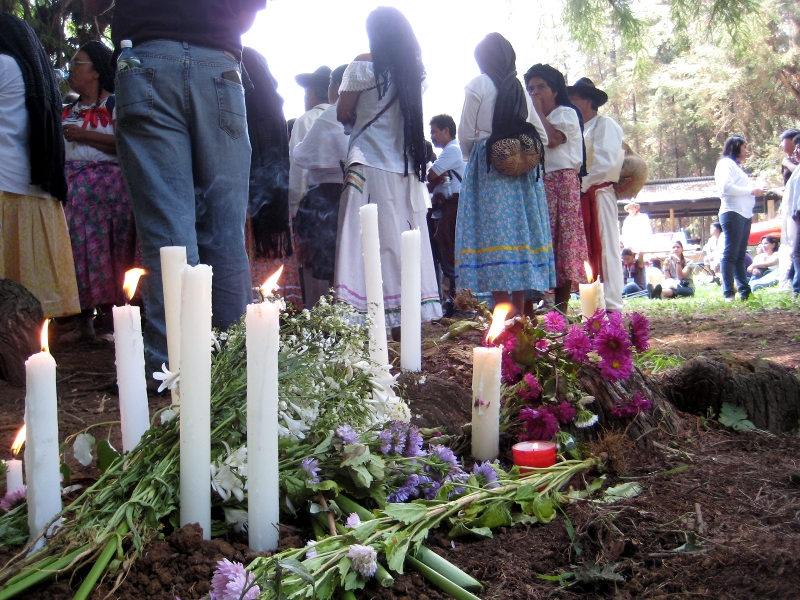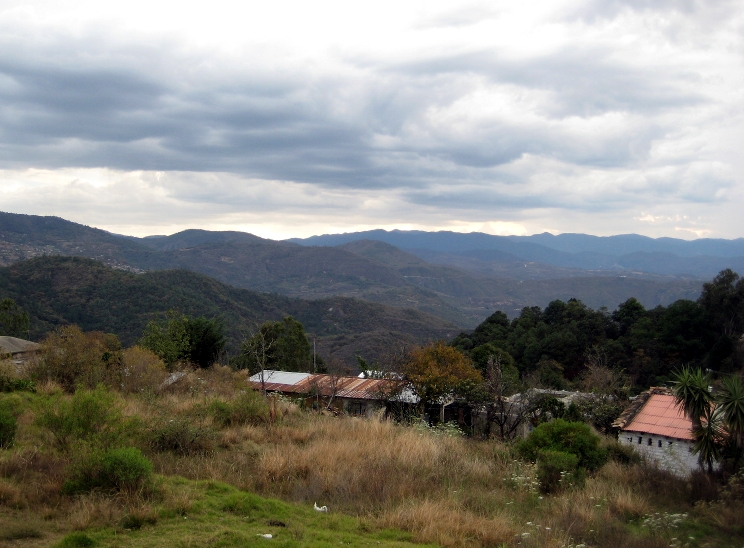Authorities in the town of Capulálpam de Méndez in the southern Mexican state of Oaxaca are celebrating what they say is a landmark ruling for other Indigenous communities seeking to halt mining operations within ancestral territories.
The federal court ruling is the latest in a five-year legal battle by town authorities to revoke mining permits in and near Capulálpam. The ruling occurred in October 2019, but town authorities only just publicized it last week. While the ruling ostensibly revokes four concessions originally granted to Compañía Natividad y Anexos and Continuum Resources Ltd, townspeople say mining activities in the area have not stopped.
“We’re speaking out because they’re in violation [of the ruling],” said Capulálpam’s Communal Holdings Commissioner Néstor Baltazar Hernández Bautista at a recent press conference in Oaxaca City. “And contempt is corruption.”

Salvador Aquino, a local communal landholder and outspoken opponent to the mine, says the ruling has two crucial points. “One, it recognizes the Indigenous agrarian community of Capulálpam as the owner of its ancestral lands.” That point is significant because in the mid-1990s, the federal government carved out a piece of Capulálpam’s ancestral territory –which coincided with the historic mining district– and gave it an independent municipal designation.
Aquino says the ruling’s second point builds upon the first: “stemming from that recognition by the Mexican state, it gives us the right to a prior, free and informed consultation process established by Convention 169.” Most of the community of Capulálpam is made up of Indigenous Zapotec people, whose communal assembly and traditional organizations remain strong.
Also known as the Indigenous and Tribal Populations Convention, ILO Convention 169 spells out the rights of Indigenous peoples with regards to economic development projects affecting their lands, territories or resources. Mexico ratified the treaty in 1990.
Aquino argues the ruling cancels all mining concessions granted within Capulálpam’s subsoil. “The federal government – the Secretary of the Economy and the Office of Mining Regulation in particular – did not consult us prior to granting these concessions,” he said at a press conference in Oaxaca City.
Years of mining activity have made town authorities particularly concerned about community access to increasingly scarce water resources.
“In the time the mine has been drilling its tunnel north, 13 of our small springs have disappeared,” explained Hernandez Bautista, who as Commissioner functions as the town assembly’s caretaker of communal property. “This is why we have to depend on the largest spring we have left, known as La Y. And that’s where the excavation is heading.”

Mineral deposits in the area are so close to the surface, the companies were planning to dig from above. “If we allow them to come in and dig a pit in that area, it would practically wipe out our last source of water… That’s why we’re so fierce in our defense.”
Changes to Mexico’s mining code in the mid-aughts set off a gold and silver rush in Oaxaca. The reforms fused exploration and extraction permits into a single concession with a 50-year lifespan. Small mining ventures, many of them based in Canada, snapped up concessions around the country.
Some of those companies have since ceased to exist, but concessions remain active, having been passed along as assets from one company to the next. The concessions in Capulálpam originally granted to now-defunct Continuum Resources appear to be owned by another Vancouver-based company, First Mining Gold Corp.
The power to grant these concessions lies with the Secretary of the Economy, which points to constitutional jurisdiction over the nation’s subsoil resources. But in Oaxaca, most of the state’s surface land is communally owned by Indigenous communities. A mine requires access to surface land not only for its main facilities, but also for auxiliary structures like ventilation shafts. Communal landholders in Oaxaca have repeatedly complained of only learning of mining concessions within their territories after companies begin exploration activities and surface access negotiations.
For all the local optimism, the October 2019 ruling to cancel the concessions in Capulálpam is not the final word. The mining companies involved and the Secretary of the Economy are mounting legal challenges.
The ruling occurred as international treaties governing Canadian business operations in Mexico were in flux. In 2019, the North American Free Trade Agreement (NAFTA) was scrapped and renegotiated, it is now called the US Mexico Canada Agreement (USMCA). Among the provisions to go was NAFTA’s Chapter 11 Investor-State Dispute Settlement (ISDS) mechanism, which allowed private companies to sue governments if legal changes could adversely affect their investments.
International trade watchers say ISDS is central to the expansion of extractive industries. “The industries that really need this are not most of the industries of the world; they’re specifically for natural resource projects,” said Sujata Dey, Trade Campaigner for the Council of Canadians. ISDS mechanisms have been heavily tilted against nations in the Global South. “It really is a terrible legacy, a terrible colonial legacy, that now has been used against developing countries,” said Dey, in a phone interview from Montreal.
Even the threat of Investor-State Dispute Settlements could coerce regulators to walk back environmental protection policies, according to Dey. While the U.S. and Canada removed Chapter 11 liabilities for themselves in the USMCA, U.S. energy companies successfully lobbied to keep a modified ISDS mechanism in place for Mexico in the new version of NAFTA.
Under the USMCA trade agreement, Canadian mining companies cannot sue Mexico for lost profits. However, Dey points out, they can use the ISDS mechanism under the terms of a different trade agreement that the US backed out of, but that still includes Mexico and Canada: the Trans-Pacific Partnership (TPP).
Mining companies encountering ground-level pushback by communities have portrayed themselves as victims of pre-exisiting local disputes or painted opponents as enemies of progress and professional protestors. But Capulálpam’s opposition to mining projects is notably united and based on lived experience.
The gold mine now operated by Mexico City-based Compañía Minera Natividad y Anexos has been intermittently active since it was opened by Spanish gold seekers in colonial times. Many of the town elders can remember either working in the mine or watching family members die from lung disease contracted on the job. In the late 1980s, townspeople began developing their own economic alternatives.
“This generation here,” said Salvador Aquino, referring to the gray-haired town authorities, “is the transitional generation that said: ‘No more, no more mining. We need to protect this for the generations to come.’”

Over the last decades, Capulálpam de Méndez has developed an economic model based on communal management of its natural resources, including an ecotourism project, a spring water bottling plant and a sustainable forestry service. Aquino is adamant that Capulálpam’s homegrown industries show “the community-based model is an alternative for creating sustainable jobs.”
That model –and its creators– are on course to battle it out in the courts with an industry that has demonstrated a willingness and ability to pour massive resources into legal fights. But in upholding or overturning the recent ruling, it could be the government of Mexico that tips the balance of the scales.
Author Bio
Shannon Young is an independent journalist based in Oaxaca since 2004. She tweets at @syoungreports.
